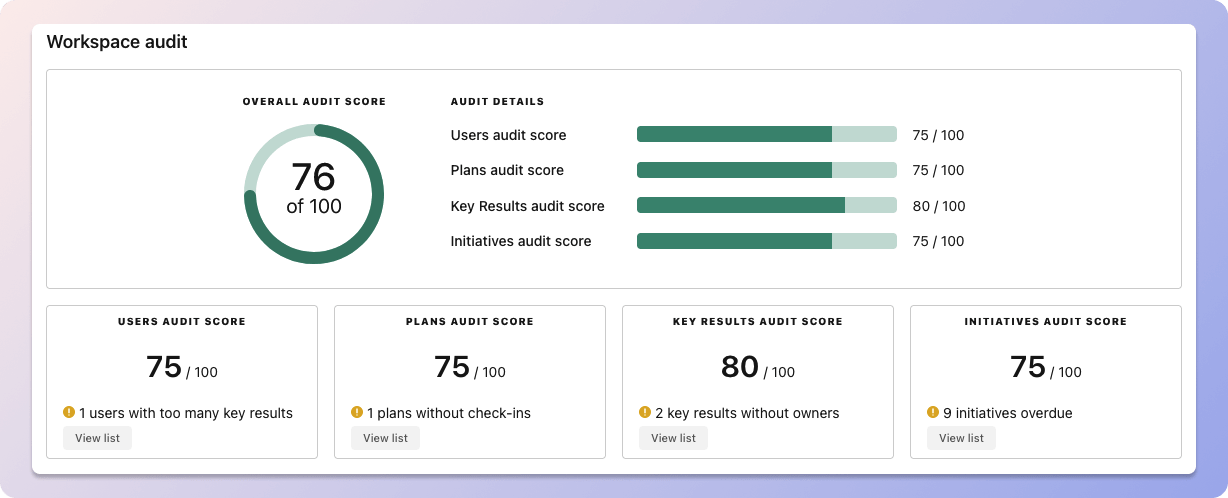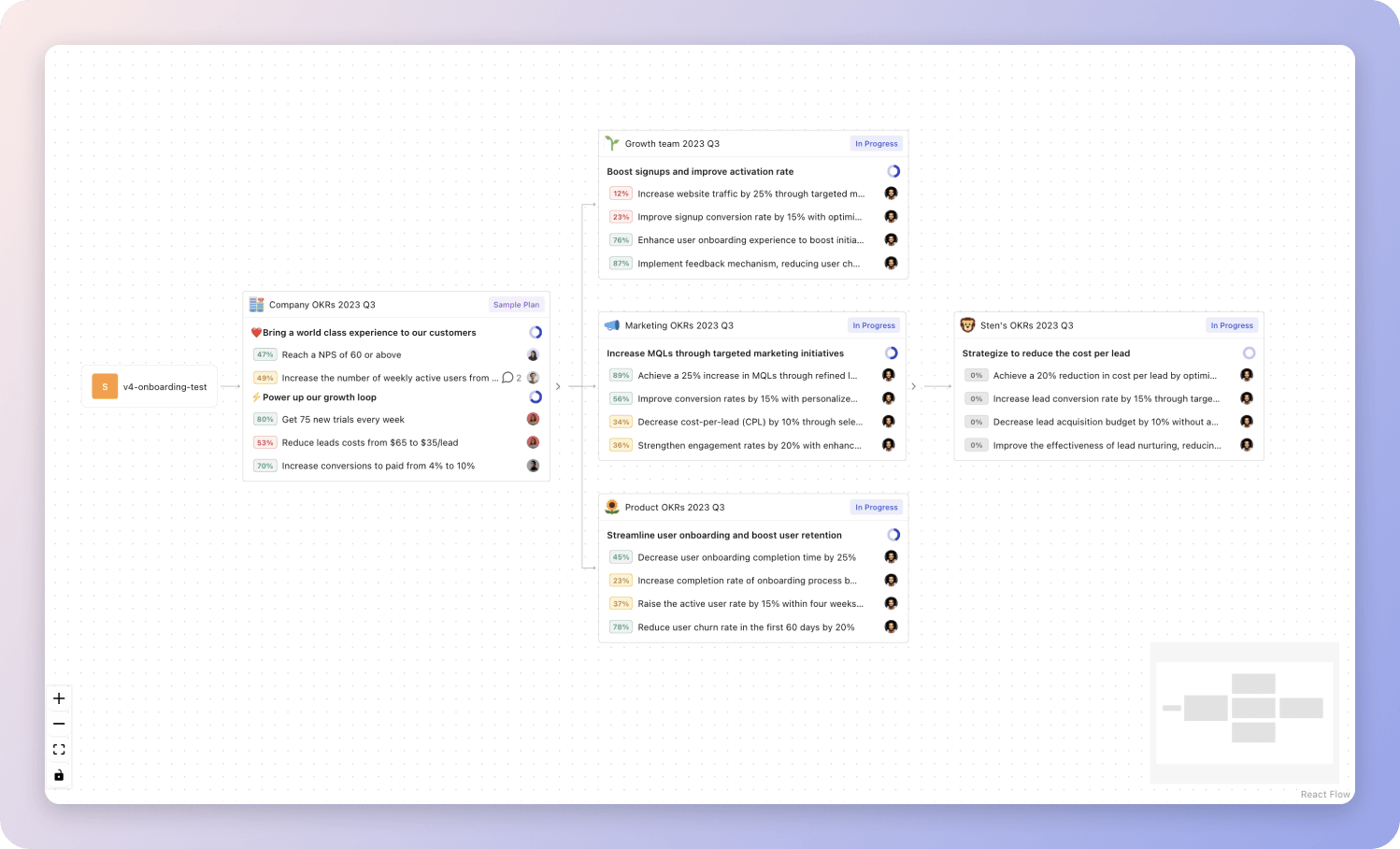4 OKR examples for Artificial Intelligence Team
What are Artificial Intelligence Team OKRs?
The Objective and Key Results (OKR) framework is a simple goal-setting methodology that was introduced at Intel by Andy Grove in the 70s. It became popular after John Doerr introduced it to Google in the 90s, and it's now used by teams of all sizes to set and track ambitious goals at scale.
OKRs are quickly gaining popularity as a goal-setting framework. But, it's not always easy to know how to write your goals, especially if it's your first time using OKRs.
We've tailored a list of OKRs examples for Artificial Intelligence Team to help you. You can look at any of the templates below to get some inspiration for your own goals.
If you want to learn more about the framework, you can read more about the OKR meaning online.
Best practices for managing your Artificial Intelligence Team OKRs
Generally speaking, your objectives should be ambitious yet achievable, and your key results should be measurable and time-bound (using the SMART framework can be helpful). It is also recommended to list strategic initiatives under your key results, as it'll help you avoid the common mistake of listing projects in your KRs.
Here are a couple of best practices extracted from our OKR implementation guide 👇
Tip #1: Limit the number of key results
Having too many OKRs is the #1 mistake that teams make when adopting the framework. The problem with tracking too many competing goals is that it will be hard for your team to know what really matters.
We recommend having 3-4 objectives, and 3-4 key results per objective. A platform like Tability can run audits on your data to help you identify the plans that have too many goals.
 Tability's audit dashboard will highlight opportunities to improve OKRs
Tability's audit dashboard will highlight opportunities to improve OKRsTip #2: Commit to the weekly check-ins
Setting good goals can be challenging, but without regular check-ins, your team will struggle to make progress. We recommend that you track your OKRs weekly to get the full benefits from the framework.
Being able to see trends for your key results will also keep yourself honest.
 Tability's check-ins will save you hours and increase transparency
Tability's check-ins will save you hours and increase transparencyTip #3: No more than 2 yellow statuses in a row
Yes, this is another tip for goal-tracking instead of goal-setting (but you'll get plenty of OKR examples below). But, once you have your goals defined, it will be your ability to keep the right sense of urgency that will make the difference.
As a rule of thumb, it's best to avoid having more than 2 yellow/at risk statuses in a row.
Make a call on the 3rd update. You should be either back on track, or off track. This sounds harsh but it's the best way to signal risks early enough to fix things.
Building your own Artificial Intelligence Team OKRs with AI
While we have some examples below, it's likely that you'll have specific scenarios that aren't covered here. There are 2 options available to you.
- Use our free OKRs generator
- Use Tability, a complete platform to set and track OKRs and initiatives
- including a GPT-4 powered goal generator
Best way to track your Artificial Intelligence Team OKRs
Your quarterly OKRs should be tracked weekly in order to get all the benefits of the OKRs framework. Reviewing progress periodically has several advantages:
- It brings the goals back to the top of the mind
- It will highlight poorly set OKRs
- It will surface execution risks
- It improves transparency and accountability
Spreadsheets are enough to get started. Then, once you need to scale you can use a proper OKR platform to make things easier.
 Tability's Strategy Map makes it easy to see all your org's OKRs
Tability's Strategy Map makes it easy to see all your org's OKRsIf you're not yet set on a tool, you can check out the 5 best OKR tracking templates guide to find the best way to monitor progress during the quarter.
Artificial Intelligence Team OKRs templates
We've covered most of the things that you need to know about setting good OKRs and tracking them effectively. It's now time to give you a series of templates that you can use for inspiration!
We've added many examples of Artificial Intelligence Team Objectives and Key Results, but we did not stop there. Understanding the difference between OKRs and projects is important, so we also added examples of strategic initiatives that relate to the OKRs.
Hope you'll find this helpful!
OKRs to develop AI chat GPT for convention
Develop AI chat GPT for convention
Implement GPT into chat platform for real-time interactions during convention
Test and troubleshoot for user experience improvement
Research suitable GPT models for the chat platform
Integrate chosen GPT model into the chat system
Train GPT model with relevant data from previous conversations
Initiate the GPT model training process
Gather and organize previous conversational data
Preprocess data for GPT model training
Analyze user feedback to improve AI chat GPT performance
Implement changes to enhance chatbot responses based on feedback analysis
Review collected user feedback on AI chat GPT performance
Identify common issues and potential improvement areas
OKRs to integrate AI tools into everyday work procedures
Integrate AI tools into everyday work procedures
Provide AI tools training to 80% of team members to ensure effective usage
Develop comprehensive training programs for selected AI tools
Identify suitable AI tools for team skill level and workflow
Schedule and conduct training sessions for team members
Implement AI software into three different work processes by end of quarter
Acquire suitable AI software for the identified processes
Identify three work processes for AI software implementation
Train staff on AI software utilization
Achieve a 15% increase in team productivity through AI tool utilization
Measure and monitor weekly performance improvements using AI tools
Provide team training on efficient AI software utilization
Select AI software that matches team workflow and productivity targets
OKRs to enhance accuracy of AI bot through quarterly FAQ updates
Enhance accuracy of AI bot through quarterly FAQ updates
Conduct comprehensive review of AI bot functionality and output by Week 4
Prepare a detailed review report before the end of Week 4
Schedule designated working hours tostudy and evaluate AI bot output
Compile existing documentation and reports on AI bot functionality
Identify and record at least five FAQ inaccuracies or improvements by Week 8
Review FAQ section thoroughly for potential inaccuracies
Note down potential areas for content improvement
Record and report identified inaccuracies by Week 8
Correct identified inaccuracies and implement improvements in FAQs by Week 12
Review and identify inaccuracies in current FAQs
Determine necessary changes and create improvements
Implement updates to FAQs by Week 12
OKRs to implement AI for content enhancement
Implement AI for content enhancement
Incorporate AI algorithms into content management system by end of quarter
Develop strategy for integrating identified AI algorithms
Implement and test AI integration within the system
Identify suitable AI algorithms for the content management system
Increase content personalization using AI by 30%
Implement AI-driven algorithms for personalized content curation
Enhance user profiling for improved personalization accuracy
Conduct A/B testing to optimize AI personalization efforts
Improve content discoverability by 40% through AI-based SEO improvements
Develop AI-driven keywords and meta tags for better search visibility
Implement AI algorithms to evaluate and optimize SEO strategies
Utilize AI for predictive analysis of trending topics and keywords
More Artificial Intelligence Team OKR templates
We have more templates to help you draft your team goals and OKRs.
OKRs to achieve exceptional sales performance as a Hotel Sales Director
OKRs to provide the best Marketing solution
OKRs to elevate agile team's performance to top-tier status
OKRs to secure the buy-in from the leadership of the 5 MAYD clusters on our strategy
OKRs to establish a substantial presence on YouTube
OKRs to enhance partnership with business for valuable audit plan fruition
OKRs resources
Here are a list of resources to help you adopt the Objectives and Key Results framework.
- To learn: Complete 2024 OKR cheat sheet
- Blog posts: ODT Blog
- Success metrics: KPIs examples